Elizabeth Spann Craig's Blog, page 160
March 5, 2013
Should Writers Query Publishers or Self-Publish?
by Elizabeth S. Craig, @elizabethscraig

I've gotten quite a few emails and direct messages on Twitter lately, asking whether I'd advise writers to query publishers or self-publish.
I've not offered much opinion on this question. For one thing, the issue has gotten (sadly) contentious and I'm cautious about entering online frays. For another, I don't like telling people what they should do. I can't possibly know what's going on in their lives, with their story, with their mindset, in order to give them good advice.
But I've noticed that my being wishy-washy and reluctant to comment hasn't won me any fans, either. One frustrated writer DMed me back on Twitter, asking me to just please give them an opinion. That's what I'll do--give an opinion. So here it is, with a proviso: this may not be the right thing for you to do. I'll tell you what I would do.
Although it’s hard to tell you what I'd do as a brand-new writer with my first manuscript in my hand facing this type of choice...because I'm just imagining that. I'm not in the same situation. Right now, I'm positioned pretty well--I'm not making gobs of cash, but I make a tidy monthly income with very little promotion. I have a fairly large online platform. I have a couple of different traditionally published series and a standalone with large publishers. This would not be the same situation for a new writer.
Knowing me, I would want to try being traditionally published with a book. This may tie into my age and the fact that when I grew up, book choices were either hardback, paperback, or a book included with a vinyl record. I wanted to be an author who had a physical book on a physical shelf. If I were twenty years old instead of nearly forty-two and didn't have that much of a past with paper books...I might feel differently. In fact--I'm sure I'd feel differently.
Digital Book World recently published results of an author survey. They asked which factors influenced the writers' decisions to publish traditionally or to self-publish. Looking at the results, I disagree with the writers surveyed. They cited distribution as a major reason for choosing a traditional publisher. I think that distribution is quickly becoming unimportant, because of digital availability. It will become even less important as readers lose their local bookstores. Barnes and Noble, a major bookseller here in the States, recently stated they expected to close 200 stores in the next ten years. More on the issues that may cause in the post, "More thoughts about the future of bookstores, triggered by Barnes & Noble’s own predictions for itself" by industry expert Mike Shatzkin on his blog.
As far as the surveyed writers' other listed factors that would make them consider traditional publishing, I can agree with "editorial help" (which can be absolutely amazing and provide an incredible education...if you're hooked up with a good editor). I do think that you can find an absolutely fantastic freelance editor to work with and receive a similar education...so this shouldn't be your primary reason to traditionally publish. I can also agree with "publisher prestige," except that I don't think of it that way--I think of it as giving the writer a boost of possibly greatly-needed confidence....if they need it.
If you choose that route, should you go through an agent or go on your own? My answer to that is changing. I don't think it's necessary to go through an agent. Be careful which agent you choose and what you agree to, if you choose to sign with an agent. If you do get an agent, you might want to get one to only help you with that one book, instead of getting signed on as a regular client. If you try to find an agent, don't spend too long looking. I spent far too long and it distracted me from my primary aim--finding a publisher. I'd consider querying publishers directly. I do have an agent. She's helped me find additional work via her contacts with editors. But times are changing. Publishers appear to be more open to working directly with unagented authors. And, when you sign with an agent, you need to be sure that you know what you’re agreeing to. There are times, for sure, when an agent can be useful, even for self-published authors: foreign rights, audio deals, etc.
How long should you spend trying to get a traditional publisher, if you choose that route? How many books do you have? If you only have the one book, work on another book as you query. And...if you're not getting any bites in six months, I'd consider assembling my team for self-publishing. Please--make sure the book is professionally edited. If you need help with your editor search, I do maintain a free database of freelance editors and other ebook professionals here.
I wouldn't put all my eggs in one basket. If my book were accepted by a publisher...great. But I'd be thinking ahead to my next project and seriously consider having that one be self-published.
The reason behind that is primarily financial. Advances from publishers are decreasing and I don't see them going up anytime soon. The production schedule takes about a year. Royalties are usually paid quarterly and are frequently not impressive. Your royalty percentage will obviously be a lot lower than going directly through an online retailer like Amazon or Barnes and Noble or Smashwords.
I'm well-positioned to make decent income by self-publishing...and I do. But let's say you're a debut author and are selling a book that's not exactly a commercial product. Maybe you sell only a few books a month.
You might consider that book a flop. But the difference is that it will remain available to readers. If that book were traditionally published and was a flop (obviously, it would sell more copies than a few a month, even doing poorly), then that could effectively be the end of your traditionally published career. Your book would be sent back as returns from the bookstore, the publisher would eventually destroy the excess copies (likely after asking you if you wanted to buy them back at a discount), and no publisher upon looking up your Nielsen BookScan numbers would be thrilled at the prospect of taking on your next book.
But with your self-published book, let's just call it a slow starter, not a flop. You write another book. And another book. You start developing a reader base (if you write well and have a professionally packaged product) and that base begins buying your earlier books--which are still available for sale and are not pulp in Manhattan somewhere.
Last year my traditionally published income included royalties on several older books, an advance payment-on-publication for one title, and acceptance advance income on two titles releasing this year. But I made more on my two self-published titles (much of the year it was only two, since my third was released in October)...one of which was intermittently free.
This advice also goes for traditionally published authors--increase revenue through self-publishing. Is there anything you've gotten your rights back to that you could self-publish? Do you have something you could write on the side...maybe an idea that had been rejected in the past? Could you write short stories just to at least experiment?
So there you go...my two cents, today, on this subject. Not everyone will agree, and there may not be a standard right answer to this question...each writer is different. Ultimately, you're the one who knows what's right for you. My two cents on this subject might change as the industry changes (probably will). I'm a hybrid writer. I'm currently writing a book that I won't pitch, but will self-publish. Looking into the future, it will be very important to stay current with industry news and changes. It's a great time to be a writer because we have choices. And we have the opportunity to do well while doing something we love.
What are your thoughts on the benefits of traditional or self-publishing, or both? Has your opinion changed over the years?

I've gotten quite a few emails and direct messages on Twitter lately, asking whether I'd advise writers to query publishers or self-publish.
I've not offered much opinion on this question. For one thing, the issue has gotten (sadly) contentious and I'm cautious about entering online frays. For another, I don't like telling people what they should do. I can't possibly know what's going on in their lives, with their story, with their mindset, in order to give them good advice.
But I've noticed that my being wishy-washy and reluctant to comment hasn't won me any fans, either. One frustrated writer DMed me back on Twitter, asking me to just please give them an opinion. That's what I'll do--give an opinion. So here it is, with a proviso: this may not be the right thing for you to do. I'll tell you what I would do.
Although it’s hard to tell you what I'd do as a brand-new writer with my first manuscript in my hand facing this type of choice...because I'm just imagining that. I'm not in the same situation. Right now, I'm positioned pretty well--I'm not making gobs of cash, but I make a tidy monthly income with very little promotion. I have a fairly large online platform. I have a couple of different traditionally published series and a standalone with large publishers. This would not be the same situation for a new writer.
Knowing me, I would want to try being traditionally published with a book. This may tie into my age and the fact that when I grew up, book choices were either hardback, paperback, or a book included with a vinyl record. I wanted to be an author who had a physical book on a physical shelf. If I were twenty years old instead of nearly forty-two and didn't have that much of a past with paper books...I might feel differently. In fact--I'm sure I'd feel differently.
Digital Book World recently published results of an author survey. They asked which factors influenced the writers' decisions to publish traditionally or to self-publish. Looking at the results, I disagree with the writers surveyed. They cited distribution as a major reason for choosing a traditional publisher. I think that distribution is quickly becoming unimportant, because of digital availability. It will become even less important as readers lose their local bookstores. Barnes and Noble, a major bookseller here in the States, recently stated they expected to close 200 stores in the next ten years. More on the issues that may cause in the post, "More thoughts about the future of bookstores, triggered by Barnes & Noble’s own predictions for itself" by industry expert Mike Shatzkin on his blog.
As far as the surveyed writers' other listed factors that would make them consider traditional publishing, I can agree with "editorial help" (which can be absolutely amazing and provide an incredible education...if you're hooked up with a good editor). I do think that you can find an absolutely fantastic freelance editor to work with and receive a similar education...so this shouldn't be your primary reason to traditionally publish. I can also agree with "publisher prestige," except that I don't think of it that way--I think of it as giving the writer a boost of possibly greatly-needed confidence....if they need it.
If you choose that route, should you go through an agent or go on your own? My answer to that is changing. I don't think it's necessary to go through an agent. Be careful which agent you choose and what you agree to, if you choose to sign with an agent. If you do get an agent, you might want to get one to only help you with that one book, instead of getting signed on as a regular client. If you try to find an agent, don't spend too long looking. I spent far too long and it distracted me from my primary aim--finding a publisher. I'd consider querying publishers directly. I do have an agent. She's helped me find additional work via her contacts with editors. But times are changing. Publishers appear to be more open to working directly with unagented authors. And, when you sign with an agent, you need to be sure that you know what you’re agreeing to. There are times, for sure, when an agent can be useful, even for self-published authors: foreign rights, audio deals, etc.
How long should you spend trying to get a traditional publisher, if you choose that route? How many books do you have? If you only have the one book, work on another book as you query. And...if you're not getting any bites in six months, I'd consider assembling my team for self-publishing. Please--make sure the book is professionally edited. If you need help with your editor search, I do maintain a free database of freelance editors and other ebook professionals here.
I wouldn't put all my eggs in one basket. If my book were accepted by a publisher...great. But I'd be thinking ahead to my next project and seriously consider having that one be self-published.
The reason behind that is primarily financial. Advances from publishers are decreasing and I don't see them going up anytime soon. The production schedule takes about a year. Royalties are usually paid quarterly and are frequently not impressive. Your royalty percentage will obviously be a lot lower than going directly through an online retailer like Amazon or Barnes and Noble or Smashwords.
I'm well-positioned to make decent income by self-publishing...and I do. But let's say you're a debut author and are selling a book that's not exactly a commercial product. Maybe you sell only a few books a month.
You might consider that book a flop. But the difference is that it will remain available to readers. If that book were traditionally published and was a flop (obviously, it would sell more copies than a few a month, even doing poorly), then that could effectively be the end of your traditionally published career. Your book would be sent back as returns from the bookstore, the publisher would eventually destroy the excess copies (likely after asking you if you wanted to buy them back at a discount), and no publisher upon looking up your Nielsen BookScan numbers would be thrilled at the prospect of taking on your next book.
But with your self-published book, let's just call it a slow starter, not a flop. You write another book. And another book. You start developing a reader base (if you write well and have a professionally packaged product) and that base begins buying your earlier books--which are still available for sale and are not pulp in Manhattan somewhere.
Last year my traditionally published income included royalties on several older books, an advance payment-on-publication for one title, and acceptance advance income on two titles releasing this year. But I made more on my two self-published titles (much of the year it was only two, since my third was released in October)...one of which was intermittently free.
This advice also goes for traditionally published authors--increase revenue through self-publishing. Is there anything you've gotten your rights back to that you could self-publish? Do you have something you could write on the side...maybe an idea that had been rejected in the past? Could you write short stories just to at least experiment?
So there you go...my two cents, today, on this subject. Not everyone will agree, and there may not be a standard right answer to this question...each writer is different. Ultimately, you're the one who knows what's right for you. My two cents on this subject might change as the industry changes (probably will). I'm a hybrid writer. I'm currently writing a book that I won't pitch, but will self-publish. Looking into the future, it will be very important to stay current with industry news and changes. It's a great time to be a writer because we have choices. And we have the opportunity to do well while doing something we love.
What are your thoughts on the benefits of traditional or self-publishing, or both? Has your opinion changed over the years?
Published on March 05, 2013 21:01
March 3, 2013
Avoid Reader Confusion
by Elizabeth S. Craig, @elizabethscraig
 I’m the kind of person who likes to know everything about an event before I attend.
I’m the kind of person who likes to know everything about an event before I attend.
Where should I park? What should I wear? How many people will be there? Should I bring money? Should I bring my own chair? What about bottled water or a lunch? How early should I arrive? Should I stay until the end or may I leave early? Do you have any helpful tips at all to help me navigate this event?
This is because I really dislike being confused. And, naturally, the gods conspire to make me as addled as possible. I’ll pore over websites and email event organizers and remain as clueless as ever.
The last couple of weekends I’ve been way out of my depth at two events for my daughter. A week ago it was a piano competition and this past weekend it was a science competition. Both times I accidentally violated the rules (I know….me! A rule violator!) by going into areas where adults weren’t allowed. I know: you’d think I’d notice there were no other adults around, but no—I’m a writer. I can be foggy. Apparently, they’re worried about parents cheating by providing help to their kids during the competitions. (If they only knew how very little I know about music and science, this wouldn’t have been a problem….)
So I was fussed at by event organizers a couple of times and embarrassed by daughter. Of course, I embarrass my children by just existing, much of the time. The irritating thing is that the event organizers hadn't listed this important bit of information on any of their flyers or on their website. They were probably just so accustomed to organizing and attending the yearly events that they forgot what it's like to be a newcomer to them.
This feeling of utter confusion is the last thing I want my readers to go through.
I do want to give them unanswered questions to keep them reading. I do want to give them something to think about and puzzle over. I do want to give them a mystery to solve. But there’s a lot they could be confused about, if I’m not careful.
Potential areas where we could confuse readers:
Character motivation. Why is Harry suddenly acting so different?
Character identity. Who’s this character again? He hasn’t been onstage for a while…
Plot. It’s fine to have a twisty plot, but are you making it too hard for the reader to follow along?
Setting. Where are we now? Check your transitions to make sure you’ve eased the reader into the new location.
Character identity in a different way. If we’ve got Molly and Sally and Len and Ian, maybe we need to rethink our names.
As an addendum to this story—I was feeling strung-out after my earlier confusion, when I finally felt like I belonged at one of these events. At the science competition, a group was about to go into a testing room—and had no pencils. For this event, if you’re not prepared, you’re out. There was great panic among the team of middle schoolers—until I reached in my purse and pulled out six or seven Ticonderogas and two pens. :) How often do you get to save the day as a writer? Not very often. There’s never anyone who calls out, “Is there a writer in the house?” But finally—I was part of the group!
How do you keep readers in the loop?
Image: MorgueFile: Guilane Nachez
 I’m the kind of person who likes to know everything about an event before I attend.
I’m the kind of person who likes to know everything about an event before I attend. Where should I park? What should I wear? How many people will be there? Should I bring money? Should I bring my own chair? What about bottled water or a lunch? How early should I arrive? Should I stay until the end or may I leave early? Do you have any helpful tips at all to help me navigate this event?
This is because I really dislike being confused. And, naturally, the gods conspire to make me as addled as possible. I’ll pore over websites and email event organizers and remain as clueless as ever.
The last couple of weekends I’ve been way out of my depth at two events for my daughter. A week ago it was a piano competition and this past weekend it was a science competition. Both times I accidentally violated the rules (I know….me! A rule violator!) by going into areas where adults weren’t allowed. I know: you’d think I’d notice there were no other adults around, but no—I’m a writer. I can be foggy. Apparently, they’re worried about parents cheating by providing help to their kids during the competitions. (If they only knew how very little I know about music and science, this wouldn’t have been a problem….)
So I was fussed at by event organizers a couple of times and embarrassed by daughter. Of course, I embarrass my children by just existing, much of the time. The irritating thing is that the event organizers hadn't listed this important bit of information on any of their flyers or on their website. They were probably just so accustomed to organizing and attending the yearly events that they forgot what it's like to be a newcomer to them.
This feeling of utter confusion is the last thing I want my readers to go through.
I do want to give them unanswered questions to keep them reading. I do want to give them something to think about and puzzle over. I do want to give them a mystery to solve. But there’s a lot they could be confused about, if I’m not careful.
Potential areas where we could confuse readers:
Character motivation. Why is Harry suddenly acting so different?
Character identity. Who’s this character again? He hasn’t been onstage for a while…
Plot. It’s fine to have a twisty plot, but are you making it too hard for the reader to follow along?
Setting. Where are we now? Check your transitions to make sure you’ve eased the reader into the new location.
Character identity in a different way. If we’ve got Molly and Sally and Len and Ian, maybe we need to rethink our names.
As an addendum to this story—I was feeling strung-out after my earlier confusion, when I finally felt like I belonged at one of these events. At the science competition, a group was about to go into a testing room—and had no pencils. For this event, if you’re not prepared, you’re out. There was great panic among the team of middle schoolers—until I reached in my purse and pulled out six or seven Ticonderogas and two pens. :) How often do you get to save the day as a writer? Not very often. There’s never anyone who calls out, “Is there a writer in the house?” But finally—I was part of the group!
How do you keep readers in the loop?
Image: MorgueFile: Guilane Nachez
Published on March 03, 2013 21:01
March 2, 2013
Twitterific
by Elizabeth S. Craig, @elizabethscraig
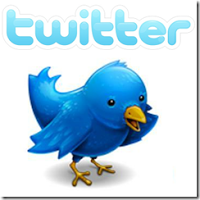
Twitterific is a compilation of all the writing links I shared the previous week.
The links are fed into the Writer’s Knowledge Base search engine (developed by writer and software engineer Mike Fleming) which has over 19,000 free articles on writing-related topics. It's the search engine for writers.
Sign up for our free newsletter for monthly writing tips and interviews with top contributors to the WKB or like us on Facebook.
Mike Fleming is working with author and writing coach James Scott Bell to offer an online, interactive, writing program to help make your next novel great. It's called "Knockout Novel" and you can learn more about it at KnockoutNovel.com. Plus, all the data is stored in your Hiveword account for easy access.
A free directory of cover designers, formatters, freelance editors, and more: http://bit.ly/nolbXq
The 5 Least Promising Scenes for a Superhero Story: http://bit.ly/W4bs9D
10 things writers should know about knives and knife fighting: http://bit.ly/15nS26A @ajackwriting
11 ways to support a writer's new book: http://bit.ly/W4bKxg @ChuckSambuchino
Are Unrealistic Expectations Killing Your Writing Career? http://bit.ly/15nSiCy @cerebralgrump
How 1 writer has dramatically increased her word count: http://bit.ly/W4bWfV @KatieGanshert
How to Correct an Awkward Interruptive Phrase: http://bit.ly/15nSstx @writing_tips
How to Get Your LCCN (Library of Congress #): http://bit.ly/15pb6Br @MyBookShepherd
2 Ways to Hook and Keep Your Reader: http://bit.ly/W5jxLg
Why We Should Try Writing in Second Person: http://bit.ly/W5jCP8 @write_practice
The Case Against Blogging: http://bit.ly/W5jHCu @SarahPinneo
Using stock photos for your self-pub covers? Remember, other authors can use the same image: http://bit.ly/15pciof
Book Design, Internet Marketing and the Nature of Human Consciousness: http://bit.ly/15pczHL @jfbookman
How to Write Better Dialogue: http://bit.ly/W5kZNA @SHalvatzis
Self-Pubbed Authors Share 5 Things They Learned in 2012: http://bit.ly/W5l3gw @livewritethrive
Tips for showing, not telling: http://bit.ly/15pcOmg @beccapuglisi
Character Development: Lack and Compensation: http://bit.ly/W5laIT @AimeeLSalter
Don't Worry About Other Writers Stealing Your Ideas: http://bit.ly/15pcYda @ava_jae
The central question of our plot: http://bit.ly/W5lhEe @Diana_Hurwitz
Tracking Time in Your Novel: http://bit.ly/W5lmYw @PBRWriter
7 tips for staying motivated by self-created deadlines: http://bit.ly/W5lrLT @JennaAvery
An introduction to kid lit: http://bit.ly/15prv8M @DIYMFA
How to Deal with Crushing Feedback on Your Creative Work: http://bit.ly/15prJgh @markmcguinness
Think Like a Publisher 2013: Projected Income:
3 Warning Signs When Bringing Your Own Emotions into Fiction Writing: http://bit.ly/YwP4r7 @cateartios
To Space or Not To Space and Other Typewriter Formatting Throwbacks: http://bit.ly/YwPeif @howtowriteshop
Options for Reactions in a Sequel: http://bit.ly/YgKJGz @KMWeiland
The Difference Between Book Wholesalers and Distributors: http://bit.ly/YwPZHX @BookMarketer
Sympathetic Characters: Betrayal: http://bit.ly/VttNQb @mooderino
Writing Without Expectation: http://bit.ly/YwQYrJ @aswinn
Should Overseas Publishers Americanize Their Authors' Names for US Distribution? http://bit.ly/Vtuby7 @EdNawotka
Ian McEwan: "My Uneasy Relationship with Fiction": http://on.tnr.com/VtuPf3# @TNR
What Makes a Writer Want to Rock Out? http://nyti.ms/YwSEBj @jrobertlennon
11 Reasons Your Blog is on a Road to Nowhere (And What to Do About It): http://bit.ly/YjAamw @problogger
5 lessons 1 writer has learned along the way: http://bit.ly/VtvT2J @jmstro
Serious Fiction and #LegitLit: Creating a Hybrid Home: http://bit.ly/YwUjqC @JennieCoughlin
A writer reports how her
sales translate to Amazon rankings: http://bit.ly/Wod8Ao
@_ChristineBell
Water as a metaphor: http://bit.ly/YwUwds @charmaineclancy
he Internet Trap and What To Do About It: http://bit.ly/VtwwJp @juliettewade @DeborahJRoss
How will shrinking shelf space impact publishing? http://bit.ly/YwVg27 @danielsm1
A Book Marketing Pro With 3 Epiphanies About Social Media Marketing for Books: http://bit.ly/YwVwON @Sparkabook
Tips for better imagery in our stories: http://bit.ly/134SeId
Where are the older women in SF/F? http://bit.ly/XMZ1if @hawkwing_lb @tordotcom
The book deal--comparing different publishing options: http://bit.ly/XMZ6Cw @behlerpublish
Stories need conflict: http://bit.ly/XMZf8Y @VickyThinks
How to Promote Your Books on Pinterest: http://bit.ly/134SOWu @goblinwriter
Four Techniques to Show Rather than Tell: http://bit.ly/XMZkJI @MarcyKennedy
7 Keys to Book Architecture: http://bit.ly/134TbjR @Book_Arch
Building an Audience in the Literary Novel Genre: http://bit.ly/134TnPX
What B Movies Can Teach Us: http://bit.ly/XMZCAt @julie_gray
10 Greatest Prison Breaks in Science Fiction and Fantasy: http://bit.ly/134TLxW @io9
How SF Can Highlight Our Historical Bias: http://bit.ly/134Uijn @MattMitrovich
Pride & Prejudice 200 Years Later: http://bit.ly/XMZXTL @Myretta
More Answers to Questions About Commas: http://bit.ly/134UwHn @writing_tips
Why You Should Work From a Coffee Shop, Even When You Have an Office: http://bit.ly/XN04yw @wesleyverhoeve
Conflict: Finding the Correct Balance: http://bit.ly/134UTS7 @americanediting
Freelancers--a query checklist: http://bit.ly/15xRjjb @karencv
What if You Don't Feel Like Writing? http://bit.ly/YduQm8 @authornordin
How realistic does a created world have to be? http://bit.ly/Ydv2lA @juliettewade
Why Apple is the stumbling block in Amazon's ebook transition: http://bit.ly/15xRA5C @laurahazardowen
Formatting Your Ebook, The iTunes Way: http://bit.ly/WgZ33G @susankayequinn
Hilary Mantel's rules for writers: http://bit.ly/15xS1Nw @fcmalby
What and How to Revise: http://bit.ly/YdvH6z @fictionnotes
Self-Publishing and Traditional Publishing: Enjoy the Best of Both Worlds: http://bit.ly/15xS9fI @cjlyonswriter @janefriedman
Timelines in the Author Business Plan: http://bit.ly/YdvRL8 @SusanSpann
In Defense of Complexity: http://bit.ly/Ydw15h @KgElfland2ndCuz
Avoid modifiers: http://bit.ly/YdwhRA @litreactor
How to Raise the Stakes in the First 50 Pages of Your Novel: http://bit.ly/15xSGOW @BrianKlems
Signs You've Chosen the Wrong Protagonist: http://bit.ly/15xSK0U @KMWeiland
Tax Prep--Is Your Writing a Hobby or a Business? http://bit.ly/15xSSgX @ashkrafton
Writing in the morning for night owls: http://bit.ly/YdwBQp @criticalmargins
The Character's Freedom: http://bit.ly/15xT003 @ShellyFrome
Smashwords: All Function and No Form: http://bit.ly/YdwPqD @scottmarlowe
5 Parallelism Problems in In-Line Lists: http://bit.ly/15xTbbE @writing_tips
Writing the High ROI Screenplay: http://bit.ly/Ydxh8g @storydepth
How Feedback Can Make you a Better Author: http://bit.ly/Ydxrwt @ollyrhodes
Using adverbs wisely: http://bit.ly/15xTGCF @melissadonovan
How To Promote Your Book on Social Media – Without Shouting: http://bit.ly/YdxKaN @jonathangunson
Reminders vs. Repetition: http://bit.ly/15xTUJO @MaryVeeWriter
10 Dos and Don'ts of Writing a Query Letter: http://bit.ly/12ReV2m @brianklems
How much does an author's appearance matter? http://bit.ly/XGcewS @passivevoiceblg
Songwriting--how do you sell your songs? You *don't* sell your songs: http://bit.ly/XbScHt @usasongs
The Power of a Reader's Word of Mouth: http://bit.ly/X4B6Lu @jodyhedlund
Avoiding the Convenient Plot Point: http://bit.ly/Xm2h7B @davidbcoe
Beware the Under-Cooked Story Concept: http://bit.ly/YjAH7X @storyfix
Listservs and Forums for Book Marketing: http://bit.ly/Y1AW94 @fictionnotes
Fleshing Out Your Protagonist: Creating An Awesome Character: http://bit.ly/U0b4w8 @woodwardkaren
Creating Sympathetic Characters: http://bit.ly/U07lyB @Lindasclare
1 writer reflects on her 2-year self-pub anniversary: http://bit.ly/U0ciaS @goblinwriter
31 Simple Ways for Writers to Maximize Efficiency in a Home Office: http://bit.ly/U06r5f @lifehackorg
Why You Need to Embrace the Conflict in Your Story: http://bit.ly/14KjXfB @joebunting
Business advice roundup for writers--accounting, marketing, branding: http://bit.ly/YDDUBx @kristinerusch
Have we planned for success? http://bit.ly/TFxq60 @behlerpublish
Quick marketing tips: http://bit.ly/11KNhiS @melissabreau
Writing Your Tragedy: http://bit.ly/14KplQO @janelebak
Top 10 fantasy mash-ups: http://bit.ly/X2MLyd @guardianbooks @danabnettclub
Can't hit send? http://bit.ly/X2MMSO @rachellegardner
Surviving The Ups and Downs of Being a Writer: http://bit.ly/YKRulZ
The Financial Reality of a Genre Novelist: http://bit.ly/X2NyPU @galleycat
Authors, Stay Off the Page: http://bit.ly/13yj8Ef @authorterryo
The 10 Most Notorious Parts of Famous Books: http://bit.ly/X2R2lq @gabehabash @publisherswkly
Tips for Hiring Editors: http://bit.ly/X2R50k @kristinerusch
Storyboarding For Success: Plotters vs. Pantsers: http://bit.ly/X2R9gK @ChuckSambuchino
How to Survive Rejection 101: http://bit.ly/YmLdir
Why Pinterest contests are easier than Facebook contests: http://bit.ly/WhXKA3 @PublicityHound
Write Like You Mean It: http://bit.ly/YmLMIR @KeithCronin
What To Do When Writing Gets You Down: http://bit.ly/WhY1mw @bluemaven
3 Things You Need To Know Before Writing A Female Protagonist: http://bit.ly/YmMPsj @VeronicaSicoe
On Writing Full-Time: http://bit.ly/WhYIfB @BrianKeene
Today's vampire – a needy, neurotic wimp: http://ind.pn/WhZCcf @Arifa_Akbar
Words that aren't actually approved words: http://bit.ly/YmORc6 @writing_tips
Using Physical Activity to Banish Writer's Block: http://bit.ly/WhZSYL
9 books on reading and writing: http://bit.ly/ZDTYqZ @fcmalby
How Much Will it Cost to Publish Your Book? http://bit.ly/ZDU16j @wherewriterswin
Plot is a Four-Letter Word: http://bit.ly/ZDUfdH
Yes, Narrators Can Still Die: http://bit.ly/Wm8L3t @chihuahuazero
The Business of Screenwriting: Sometimes you just have to say "Yes"… even to crap projects: http://bit.ly/ZDUllr @gointothestory
How to Know When You Are Killing Your Scenes: http://bit.ly/WmAsJt @JeanOram
Tips for choosing a narrator for your audio book: http://bit.ly/ZEhfsZ @karenrosesmith
Worldbuilding and Plot: http://bit.ly/WmAZuR @davidbcoe
Sympathetic Characters: Unfairness: http://bit.ly/ZEhEM5 @mooderino
Don't read your reviews: http://bit.ly/ZEhXX6 @Michelle_Gagnon
How to Find Your Creative Sweet Spot: http://bit.ly/WmCf0X @emilywenstrom
How to Find Your Creative Sweet Spot: http://bit.ly/WmCf0X @emilywenstrom
Using spreadsheets for writers' business deductions: http://bit.ly/ZEj7C4
Eliminating Redundancy in Your Writing: http://bit.ly/ZEvdLr @writerscramp1
The Top 10 Mistakes Writers Make When Self-Publishing a Book: http://bit.ly/WmOOcQ @guykawasaki
Stories do not need a Nemesis character: http://bit.ly/WmONFz @gointothestory
Tips for sticking with a habit: http://bit.ly/ZEvvSz @leobabauta
Top 10 DAW (Digital Audio Workstation) For Songwriting: http://bit.ly/ZEvCgU @usasong
John Cleese on the 5 Factors to Make Your Life More Creative: http://bit.ly/ZEvIVV @brainpicker
10 Elements of a Successful Writing Career: http://bit.ly/WmPnmT @buddhapuss
Author vs. Characters: Can Our Morals Be Different? http://bit.ly/ZEvXA5 @jamigold
Getting Started With Microsoft Word Styles for Book Layout: http://bit.ly/WmPz5x @JFBookman
How to Survive the Waiting Game: http://bit.ly/ZEwfqK @ava_jae
Great Character: Lt. Aldo Raine ("Inglourious Basterds"): http://bit.ly/WmPTkS @gointothestory
The Power of a Storytelling Model: http://bit.ly/WmPY7Z @storyfix
So You Want To Quit Writing? http://bit.ly/WmQmDq @museinks
The Writer as Inventor: http://bit.ly/ZEwJgG @SarahrCallender
Mystery writing--the butler did it? http://tinyurl.com/a7jy62e @kbowenwriter
Come in late and leave early for an effectively written
scene: http://bit.ly/ZEioka @jeanoram
Points of view: an overview: http://bit.ly/XX3qiv
@p2p_editor
Buying your way into the bestseller lists: http://bit.ly/XYFtas
@Porter_Anderson @mitchjoel @JeffreyT1
Literary agencies experience mergers: http://bit.ly/Ww4BWB
@Porter_Anderson @jonnygeller @jasonashlock
A look at characters who evolve throughout crime fiction
series: http://bit.ly/Xakh5N @mkinberg
10 steps to blogging success: http://bit.ly/YXAhVe
@mollygreene
The desire for respectability as a theme, and motive, in
crime fiction: http://bit.ly/XEx5B4 @mkinberg
LibraryThing and Goodreads: Meeting Readers, Book
Giveaways and Finding Reviewers: http://bit.ly/XETCNW @fcmalby
Advice to a post-Nook Barnes and Noble: http://bit.ly/XFPxJy
@Porter_Anderson @jwikert @laurahazardowen
6
Pitching Tactics You Can Learn From Blake Snyder: http://bit.ly/Y4wq81
@goodinaroom
Published on March 02, 2013 21:01
February 28, 2013
Giving Too Much Away
by Elizabeth S. Craig, @elizabethscraig
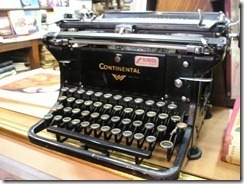 As I wrote last week, I’ve really had a time with my current story. I’ve kept moving forward with it, but wondering about the root problem with the book. There were many problems with the story (oh boy!), but I couldn’t figure out what the global story issue was.
As I wrote last week, I’ve really had a time with my current story. I’ve kept moving forward with it, but wondering about the root problem with the book. There were many problems with the story (oh boy!), but I couldn’t figure out what the global story issue was.
As I was finishing another scene where I was just treading water, I finally hit on it: I’d answered all the questions I’d posed.
Not the murderer, obviously…I haven’t gotten to the end of the book. But I stated everything, up front, at the very beginning of the book.
So, I basically introduced suspect #1, stated the suspect’s motive (same with suspects 2-4) and spent the rest of the draft rehashing what I’d already told the reader.
That makes for a boring book.
And it’s extraordinary that I did this, because I’d had this same revelation several books ago and vowed never to get into this mess again.
There is a very basic, if time-consuming, fix. When I write my second draft, I’m taking out every instance where I outright gave away the motive. I’m going to hint that there is a motive and indicate that the character is a suspect through gossip, observation, etc. Then the sleuth actually gets to go talk to people and uncover motives.
That’s what sleuths do. And I’d just taken away the sleuth’s job from her. No wonder my protagonist, Myrtle’s, voice was out of whack throughout the story. Myrtle was uncomfortable with the way I was writing the book.
Of course, this entails rewriting the entire first third of the book.
I don't think I've ever had quite as massive of a rewrite, but I know my plan for addressing it--not until the first draft is over. So, how do you accomplish such a feat? Just mark (I use Word's highlighting option) the place where you started writing the book after you made your dreadful realization. So I'm marking a sentence in my book. Everything after that point is in line with my discovery--I'll be uncovering motives of the suspects after that point.
Then I'll rewrite the beginning of the book to reflect the change.
How to avoid getting into this mess to begin with (whatever your genre):
Ask yourself what your protagonist knows. If he or she knows too much at the beginning of the story, then you’re going to have the same problem I had—you’ll be rehashing some of the same stuff repeatedly.
Think about what information you’ve given the reader at the beginning of the story or early on. If you haven’t raised enough unanswered questions, are they going to get bored? Will they keep reading even though there’s really no answers to be found later on?
The questions posed don't have to be as big as mine (motives for suspects). You can do the same with smaller questions: what does this character have to hide? Why are two friends now not speaking to each other? Why did Jim lose his job? What was behind Selma's emotional outburst at dinner? Delaying answering these smaller questions increases tension and helps provide the story with some extra intrigue. And holding off revealing the answers gives the readers incentive to keep reading.
Have you ever given too much away too early in your story? How do you remind yourself not to? I’m considering a big sticky note on my laptop…
Image: MorgueFile: Alvimann
 As I wrote last week, I’ve really had a time with my current story. I’ve kept moving forward with it, but wondering about the root problem with the book. There were many problems with the story (oh boy!), but I couldn’t figure out what the global story issue was.
As I wrote last week, I’ve really had a time with my current story. I’ve kept moving forward with it, but wondering about the root problem with the book. There were many problems with the story (oh boy!), but I couldn’t figure out what the global story issue was.As I was finishing another scene where I was just treading water, I finally hit on it: I’d answered all the questions I’d posed.
Not the murderer, obviously…I haven’t gotten to the end of the book. But I stated everything, up front, at the very beginning of the book.
So, I basically introduced suspect #1, stated the suspect’s motive (same with suspects 2-4) and spent the rest of the draft rehashing what I’d already told the reader.
That makes for a boring book.
And it’s extraordinary that I did this, because I’d had this same revelation several books ago and vowed never to get into this mess again.
There is a very basic, if time-consuming, fix. When I write my second draft, I’m taking out every instance where I outright gave away the motive. I’m going to hint that there is a motive and indicate that the character is a suspect through gossip, observation, etc. Then the sleuth actually gets to go talk to people and uncover motives.
That’s what sleuths do. And I’d just taken away the sleuth’s job from her. No wonder my protagonist, Myrtle’s, voice was out of whack throughout the story. Myrtle was uncomfortable with the way I was writing the book.
Of course, this entails rewriting the entire first third of the book.
I don't think I've ever had quite as massive of a rewrite, but I know my plan for addressing it--not until the first draft is over. So, how do you accomplish such a feat? Just mark (I use Word's highlighting option) the place where you started writing the book after you made your dreadful realization. So I'm marking a sentence in my book. Everything after that point is in line with my discovery--I'll be uncovering motives of the suspects after that point.
Then I'll rewrite the beginning of the book to reflect the change.
How to avoid getting into this mess to begin with (whatever your genre):
Ask yourself what your protagonist knows. If he or she knows too much at the beginning of the story, then you’re going to have the same problem I had—you’ll be rehashing some of the same stuff repeatedly.
Think about what information you’ve given the reader at the beginning of the story or early on. If you haven’t raised enough unanswered questions, are they going to get bored? Will they keep reading even though there’s really no answers to be found later on?
The questions posed don't have to be as big as mine (motives for suspects). You can do the same with smaller questions: what does this character have to hide? Why are two friends now not speaking to each other? Why did Jim lose his job? What was behind Selma's emotional outburst at dinner? Delaying answering these smaller questions increases tension and helps provide the story with some extra intrigue. And holding off revealing the answers gives the readers incentive to keep reading.
Have you ever given too much away too early in your story? How do you remind yourself not to? I’m considering a big sticky note on my laptop…
Image: MorgueFile: Alvimann
Published on February 28, 2013 21:01
February 27, 2013
LibraryThing and Goodreads: Meeting Readers, Book Giveaways and Finding Reviewers
by F.C Malby (@fcmalby)
Book reviews can create the difference between floundering sales and a book which is regularly making its way into the hands of new readers. Promoting your book doesn’t need to be a painful process and book reviews and connections with readers are vital to the success of your book, especially in the early days.
I’ll share my experiences of both LibraryThing and Goodreads so that you have a better idea of where to go before your book is released, and how to set up a giveaway and garner some honest reviews.

Goodreads
Stats: Launched in 2007, Goodreads claims to be the largest site for readers and book recommendations in the world, with more than 14,000,000 members who have added more than 460,000,000 books to their shelves.
I signed up as a Goodreads Author which gives you a different profile to readers, allowing you to:
· Add a picture and bio, listing your influences and genre (this is important for finding readers in your niche).
· Share your favourite books with readers.
· Add your blog feed into your profile (this has helped to build my blog platform).
· Publicise book signings, speaking engagements and other events.
· Share book extracts and quotes (some authors say that adding quotes has helped to boost their sales).
· Write a quiz about your book, add it to specific listopia lists and post a book trailer video.
· Lead a Q&A discussion for readers and join in with forum chat.
In the months running up to my book release I spent some time exploring the site and getting to know readers through forums before I set up a book giveaway. Find readers in your genre and you will have more success with your books. It is important not to just sit on Goodreads as a disconnected author but to get involved, upload books you have enjoyed and review them, add friends, join in with discussions and be present. You can set the email alerts to send as much or as little information as you like to your email account and you can always check all activity on your Goodreads account and reply to messages.
A month before my book was due to be released I entered it into a giveaway (it has to be pre-prelease). This is set for a certain period of time with a fixed number of hard copies to give away (Goodreads won’t accept eBook files as giveaways) and when it closes they email a list of addresses of the winners. While readers sign up for the giveaway, if they like the book they will also add your book onto their shelf to read later. I set up the giveaway for 3 weeks and 1,500 readers signed up for the giveaway. While these figures are higher than the average of 800 sign-ups there was no significant boost to sales at the time and just two reviews (one from a winner).
Nearly 500 people added the book to their shelves marked as ‘to read.’ This is a longer term strategy which works as part of the giveaway and for this I am grateful. It is difficult to gauge how sales are impacted as book buying is spread out over time. Readers have also taken a book quiz which I set up. You can also set up listopia lists with books which are similar to yours, add book quotes and join in with forum discussions. The readers and authors I have met on Goodreads have been friendly and informative, some also connecting via facebook or twitter.
Goodreads works in the same way as Amazon by recommending books by other authors which are similar to those a member’s list, which means that when readers add books which Goodreads deems to be similar to your title, it may then be recommended as a book to read. This is a really helpful marketing tool.

LibraryThing –
Stats: Launched in 2005, LibraryThing has more than 1,600,000 members with over 78,900,000 books catalogued. Nearly 2,000,000 reviews of more than 664,000 works have been written by members.
Once I had become familiar with Goodreads, I explored LibraryThing. I entered a member giveaway after the book was released at the end of December 2012, but they also have early review giveaways. The option of a giveaway before or after your release date makes this more flexible.
You can giveaway either hard copies or eBook files, which allows you to give away many more copies using .mobi and .epub files. Most authors offer eBook files only and enter 25, 50, 75 or 100 copies into a giveaway, stating that they will be giving away eBook files only. This made more sense to me so I set up a giveaway for 50 copies but I noticed that books are listed in order of the number of copies to give away and then put into date order, so if you want to be nearer the top of the list, it might be better to release 100 copies, although remember that you will need to send these all out.
I set the giveaway for 2 weeks and 45 people signed up in 3 days. If more people sign up than the allotted number to giveaway then LibraryThing will pick winners at random, as with Goodreads. When the giveaway closes, LibraryThing also emails you with a list of winners with their email addresses, which is much quicker and cheaper method of distribution.
I had read that there was less interaction between authors with readers on LibraryThing but I have had some good chats with readers, and reviews on various sites (including Amazon, Goodreads, Barnes and Noble and LibraryThing) from the giveaway with some really encouraging emails from readers with lots of feedback. Although there were less sign ups than on Goodreads, the requests build up quite quickly and I had more reviews and emails. Several people have connected with me through other social media sites and I noticed a jump in sales following the giveaway. I have really enjoyed the experience and would recommend exploring this site if you haven’t yet joined. It’s important to remember that you can’t demand reviews, you can only offer your books with a review request. Be courteous and join in with the communities on each site. They are both full of interesting readers, authors, groups and forum discussions.
OVERALL:
Goodreads
Giveaway: hard copies only.
More limited in giving away hard copies, factoring in the cost of purchase and postage.
Readers add your book to their to-read list through a giveaway.
Reviews generally only on Goodreads.
The option to create Listopia lists, quizzes and add book quotes widens the number of pages where your book will be listed on the site.
LibraryThing
Giveaway: hard copies or .mobi/.epub files.
Option of either format gives you the freedom to list many more giveaway copies.
Your book is added to lists organically but it takes time.
Reviews can be requested for any site.
Zeitgeist page – fascinating insight into book/reader stats. (incl. most reviewed books and top languages of translated books).
Author Bio
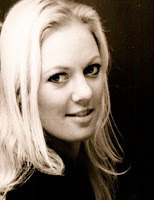
F.C. Malby is the author of ‘Take Me to the Castle,’ set in Prague during the Velvet Revolution. She is a novelist, a photographer and a teacher, and has taught English in the Czech Republic, the Philippines and London. You can find her blog and website at fcmalby.com, or connect on twitter @fcmalby, or on her facebook author page.
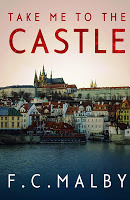
Take Me to the Castle is currently free to download this week until 1 March. View the book trailer.
Published on February 27, 2013 21:01
February 26, 2013
Ten Steps to Blogging Success
Guest post by Molly Greene, @mollygreene
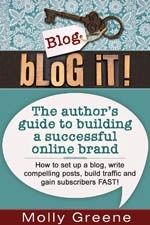
It’s true for
nearly every author: Attracting readers to your website is the main reason you
blog. After all, your books are your business, and according to a 2012 report
by marketing and web analytics specialist HubSpot, businesses that post new
blog content even once or twice a month get much more traffic than those that
don’t blog at all. Per HubSpot, “an average company will see a 45% growth in
traffic when total blog articles increase from 11-20 to 21-50, and a 59% increase
when total blog articles reach 100 to 200.”
Blogging gets
results. Every post forges another path to your website. So if you’ve wondered
how and why to begin – or if you’re stalled somewhere in the process and need guidance,
here are the basic steps.
1. Set
up a website. Choose
free Wordpress.com, free Blogger.com, even inexpensive Squarespace. With a
little research into what each platform offers, you can choose the right one
for you. If you already have a free site and you’re considering a move to self-hosted
Wordpress.org, pre-planning will allow for a seamless transition.
2. Determine
topic categories. Who
are you writing for? Who is your ideal reader? Choose a handful of topic
categories based on the answer. Also, keep in mind that every work of fiction
contains plot elements an author can explore on their blog. So pinpoint the
themes in your books, determine how they overlap real world topics you are
passionate about, and write your posts around this common ground.
3. Establish
a posting schedule.
Don’t be overly concerned about frequency at first, simply post as many times a
month as you can comfortably handle without going insane. Focus on quality before
quantity, and discipline yourself to post according to a pre-determined
schedule. Consistency is key.
4. Write
great content. This may
be the biggest challenge: The goal is to share good, evergreen content that
offers value to your ideal reader. Make them laugh, make them cry, make them
think, educate them. Whichever applies, strive to write posts that hit the mark
every time.
5. Interact
on social media. One of
the most effective methods to draw website traffic is sharing content across
social media accounts. Establish, build, and grow a following on pertinent social media platforms such as Facebook,
Twitter, Goodreads, Pinterest, and LinkedIn. You’ll be tempted to follow and
market to authors because they are so supportive, but be sure to seek out
readers, too. You want readers. Readers, readers, readers.
6. Bring
traffic to your site. Continue
to grow more traffic through consistent sharing and interacting on your social
media accounts plus the application of SEO principles, guest posting, optimizing
your website, hosting guests, and other methods.
7. Use
a call to action. The
primary goal of every author’s website is to sell books, but few accomplish
this directly through blog-driven sales. Instead, we rely on the second most
important goal for a website, readers who sign up to receive regular updates. A
great email list can be the most effective method for an author to actually
sell books. Use a really good call to action on your blog to encourage visitors
to subscribe.
8. Repurpose
content. Try to find
three channels to re-use every word you write. Ideas: rework some of your blog content
into ebooks that you can sell or give away in contests or as a subscriber
incentive. Rewrite posts and share them on syndication sites. Rewrite the guest
posts you share with other bloggers and use them in ebooks and/or on your own
site.
9. Use
email to launch products.
Use your email list to announce new ebooks and novels as you launch them. Then
use your email list to learn more about your readers (polls, surveys) and to
remind them about your work in a way that adds value, such as through freebies,
contests, giveaways, and whatever creative methods you can think up.
10. Continue
to learn the craft. Never
stop educating yourself about blogging best practices, SEO principles and how
to implement them, website enhancements, and third party vendors that will help
you automate, streamline and improve your blogging experience.
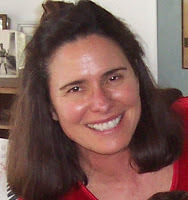
Molly
Greene is an author, blogger, and blogging coach with a preference for reading,
writing, remodeling, and rural life. Her nonfiction titles include Blog
It! The author’s guide to
building a successful online brand, and the self-awareness guide, Someone
Worth Becoming (July 2013).
Molly is working on a second novel, Rapunzel ; her fiction debut, Mark of the Loon , is available
at major online retailers . Meanwhile, she blogs about self-publishing
topics and her crazy, ever-changing world at Molly-Greene.com .
Visit and subscribe! Follow & Friend
Molly on Twitter • Goodreads • Facebook • Google+
Published on February 26, 2013 21:01
February 25, 2013
Why I Write Cozy Mysteries—Guest Post by Chrystle Fiedler
by Chrystle Fiedler, @ChrystleFiedler
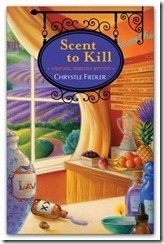 Reality is overrated. At least I think so. Instead, I find comfort escaping into the world of a cozy mystery. Before I wrote cozy mysteries, I read them, Agatha Christie’s tales of Hercule Poirot and Miss Marple, Sherlock Holmes and Dashiell Hammett and watched them; Midsomer Murders, Inspector Morse, and Murder, She Wrote which I’ve recently rediscovered on Hallmark TV.
Reality is overrated. At least I think so. Instead, I find comfort escaping into the world of a cozy mystery. Before I wrote cozy mysteries, I read them, Agatha Christie’s tales of Hercule Poirot and Miss Marple, Sherlock Holmes and Dashiell Hammett and watched them; Midsomer Murders, Inspector Morse, and Murder, She Wrote which I’ve recently rediscovered on Hallmark TV.
Whether it’s in these pages or by watching these shows, I escape, like you do, to the coziness of quaint country villages, dappled country lanes, inviting stores on the high street, and of course, lovely rose covered cottages; inside, a cup of tea waiting.
Of course, the world of the cozy is in stark contrast to the murderous crimes committed there that shatter the peace and serenity. But we also know the detective will figure out the puzzle, catch the killer and put things back in their proper place. That’s incredibly satisfying to me as a writer as well, to have the power to put things back into balance.
My natural remedies mysteries are also set in a classic cozy setting, in this case, a real, idyllic fishing village on the East End of Long Island in NY called Greenport. When I was growing up the area was somewhat depressed but within the past two decades, Greenport has come into its own as a tourist destination with upscale eateries and boutiques, sandwiched between Mom and Pop hardware stores, diners and retro stores. Forbes magazine has even named Greenport one of the prettiest villages in the U.S.
I’ve always had an interest in natural medicine so I made my cozy protagonist, Willow McQuade, a naturopathic doctor who takes over a health food store – Nature’s Way Market & Café - after her Aunt Claire meets an untimely end. The store is located in a lovely 3 story yellow Victorian house across with a water view. Inside, it’s cozy too, with a homey feel, yummy cooking smells and the scent of essential oils, herbs and flower essences.
To complete my cozy universe, I gave Willow, a hunky ex-cop love interest named Jackson Spade, an adorable rescued dog and two rescued cats, loyal friends and workers and the spirit of her Aunt Claire to guide her.
Writing the natural remedies mysteries also gives me a wonderful chance to share what I’ve learned about natural cures with readers. It’s amazing what you can find in your kitchen and garden that can soothe and heal you. That’s a cozy feeling too.
In Scent to Kill, my latest natural remedies mystery cozy, I focus on the practice of aromatherapy, the use of essential oils to improve health and well-being. As I’m writing I can smell the lavender, jasmine and roses.
Whether I am writing my cozies, reading or watching them, I experience the same comfortable, homey, and safe feeling, knowing that no matter what happens, that all will be well in the end. Where else can you get that guarantee? Cozy mysteries are one of the best antidotes to reality I’ve found. How about you?
******
For a chance to win a copy of Scent to Kill: A Natural Remedies Mystery just leave a comment.
Here’s the scoop on Scent to Kill: A Natural Remedies Mystery:
“Scent to Kill is a well-crafted mystery…Devotees of natural medicine and aromatherapy will enjoy the tips that appear at the beginning of each chapter and scattered throughout the text.” Publisher’s Weekly
Willow McQuade, naturopathic doctor, along with her hunky ex-cop boyfriend Jackson Spade, attend a party for a psychic TV show that is filming on Long Island’s idyllic East End. However, Willow is much more interested in visiting the estate’s lavender farm, seeking inspiration for the new aromatherapy workshops she'll be holding at her store, Nature’s Way Market & Café.
Before the party is over, Roger Bixby one of the producers is dead and the police suspect murder. Roger was working on the show, MJ’s Mind, with Carly Bixby, his ex-wife and the new girlfriend of Willow's ex from L.A., TV writer/producer Simon Lewis.
After Willow leaves the party, she gets a frantic text from Simon asking for her help. Since Simon had a fight with Roger earlier in the evening, and because of his death is now the primary shareholder in Galaxy films, Willow's ex becomes the prime suspect. Simon begs her to crack the case and clear him of the murder. MJ McClellan, the psychic and star of the show also asks Willow for help. She hires Willow to provide natural remedies, including aromatherapy, massage, acupuncture and yoga to soothe the agitated crew of her show.
To find the killer, Willow has to deal with ghosts in a haunted mansion, a truly dysfunctional family, death threats and “accidents,” while trying to untangle a homicide identical to one committed during prohibition. Thankfully, Jackson has been hired to provide security and is there to watch her back and help Willow solve this spooky mystery.
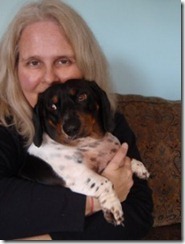 Chrystle Fiedler is the author of SCENT TO KILL, (Gallery Books/Simon & Schuster) the second in the NATURAL REMEDIES MYSTERY series, DEATH DROPS: A Natural Remedies Mystery, the non-fiction title THE COMPLETE IDIOT'S GUIDE TO NATURAL REMEDIES (Alpha, 2009), co-author of BEAT SUGAR ADDICTION NOW! (Fairwinds Press, 2010), currently in its fourth printing, the BEAT SUGAR ADDICTION NOW!COOKBOOK (Fairwinds Press, 2012) and THE COUNTRY ALMANAC OF HOME REMEDIES (Fairwinds, 2011). Chrystle’s magazine articles featuring natural remedies have appeared in many national publications including Natural Health, Vegetarian Times, Better Homes & Gardens and Remedy. Visit
www.chrystlefiedler.com
.
Chrystle Fiedler is the author of SCENT TO KILL, (Gallery Books/Simon & Schuster) the second in the NATURAL REMEDIES MYSTERY series, DEATH DROPS: A Natural Remedies Mystery, the non-fiction title THE COMPLETE IDIOT'S GUIDE TO NATURAL REMEDIES (Alpha, 2009), co-author of BEAT SUGAR ADDICTION NOW! (Fairwinds Press, 2010), currently in its fourth printing, the BEAT SUGAR ADDICTION NOW!COOKBOOK (Fairwinds Press, 2012) and THE COUNTRY ALMANAC OF HOME REMEDIES (Fairwinds, 2011). Chrystle’s magazine articles featuring natural remedies have appeared in many national publications including Natural Health, Vegetarian Times, Better Homes & Gardens and Remedy. Visit
www.chrystlefiedler.com
.
 Reality is overrated. At least I think so. Instead, I find comfort escaping into the world of a cozy mystery. Before I wrote cozy mysteries, I read them, Agatha Christie’s tales of Hercule Poirot and Miss Marple, Sherlock Holmes and Dashiell Hammett and watched them; Midsomer Murders, Inspector Morse, and Murder, She Wrote which I’ve recently rediscovered on Hallmark TV.
Reality is overrated. At least I think so. Instead, I find comfort escaping into the world of a cozy mystery. Before I wrote cozy mysteries, I read them, Agatha Christie’s tales of Hercule Poirot and Miss Marple, Sherlock Holmes and Dashiell Hammett and watched them; Midsomer Murders, Inspector Morse, and Murder, She Wrote which I’ve recently rediscovered on Hallmark TV. Whether it’s in these pages or by watching these shows, I escape, like you do, to the coziness of quaint country villages, dappled country lanes, inviting stores on the high street, and of course, lovely rose covered cottages; inside, a cup of tea waiting.
Of course, the world of the cozy is in stark contrast to the murderous crimes committed there that shatter the peace and serenity. But we also know the detective will figure out the puzzle, catch the killer and put things back in their proper place. That’s incredibly satisfying to me as a writer as well, to have the power to put things back into balance.
My natural remedies mysteries are also set in a classic cozy setting, in this case, a real, idyllic fishing village on the East End of Long Island in NY called Greenport. When I was growing up the area was somewhat depressed but within the past two decades, Greenport has come into its own as a tourist destination with upscale eateries and boutiques, sandwiched between Mom and Pop hardware stores, diners and retro stores. Forbes magazine has even named Greenport one of the prettiest villages in the U.S.
I’ve always had an interest in natural medicine so I made my cozy protagonist, Willow McQuade, a naturopathic doctor who takes over a health food store – Nature’s Way Market & Café - after her Aunt Claire meets an untimely end. The store is located in a lovely 3 story yellow Victorian house across with a water view. Inside, it’s cozy too, with a homey feel, yummy cooking smells and the scent of essential oils, herbs and flower essences.
To complete my cozy universe, I gave Willow, a hunky ex-cop love interest named Jackson Spade, an adorable rescued dog and two rescued cats, loyal friends and workers and the spirit of her Aunt Claire to guide her.
Writing the natural remedies mysteries also gives me a wonderful chance to share what I’ve learned about natural cures with readers. It’s amazing what you can find in your kitchen and garden that can soothe and heal you. That’s a cozy feeling too.
In Scent to Kill, my latest natural remedies mystery cozy, I focus on the practice of aromatherapy, the use of essential oils to improve health and well-being. As I’m writing I can smell the lavender, jasmine and roses.
Whether I am writing my cozies, reading or watching them, I experience the same comfortable, homey, and safe feeling, knowing that no matter what happens, that all will be well in the end. Where else can you get that guarantee? Cozy mysteries are one of the best antidotes to reality I’ve found. How about you?
******
For a chance to win a copy of Scent to Kill: A Natural Remedies Mystery just leave a comment.
Here’s the scoop on Scent to Kill: A Natural Remedies Mystery:
“Scent to Kill is a well-crafted mystery…Devotees of natural medicine and aromatherapy will enjoy the tips that appear at the beginning of each chapter and scattered throughout the text.” Publisher’s Weekly
Willow McQuade, naturopathic doctor, along with her hunky ex-cop boyfriend Jackson Spade, attend a party for a psychic TV show that is filming on Long Island’s idyllic East End. However, Willow is much more interested in visiting the estate’s lavender farm, seeking inspiration for the new aromatherapy workshops she'll be holding at her store, Nature’s Way Market & Café.
Before the party is over, Roger Bixby one of the producers is dead and the police suspect murder. Roger was working on the show, MJ’s Mind, with Carly Bixby, his ex-wife and the new girlfriend of Willow's ex from L.A., TV writer/producer Simon Lewis.
After Willow leaves the party, she gets a frantic text from Simon asking for her help. Since Simon had a fight with Roger earlier in the evening, and because of his death is now the primary shareholder in Galaxy films, Willow's ex becomes the prime suspect. Simon begs her to crack the case and clear him of the murder. MJ McClellan, the psychic and star of the show also asks Willow for help. She hires Willow to provide natural remedies, including aromatherapy, massage, acupuncture and yoga to soothe the agitated crew of her show.
To find the killer, Willow has to deal with ghosts in a haunted mansion, a truly dysfunctional family, death threats and “accidents,” while trying to untangle a homicide identical to one committed during prohibition. Thankfully, Jackson has been hired to provide security and is there to watch her back and help Willow solve this spooky mystery.
 Chrystle Fiedler is the author of SCENT TO KILL, (Gallery Books/Simon & Schuster) the second in the NATURAL REMEDIES MYSTERY series, DEATH DROPS: A Natural Remedies Mystery, the non-fiction title THE COMPLETE IDIOT'S GUIDE TO NATURAL REMEDIES (Alpha, 2009), co-author of BEAT SUGAR ADDICTION NOW! (Fairwinds Press, 2010), currently in its fourth printing, the BEAT SUGAR ADDICTION NOW!COOKBOOK (Fairwinds Press, 2012) and THE COUNTRY ALMANAC OF HOME REMEDIES (Fairwinds, 2011). Chrystle’s magazine articles featuring natural remedies have appeared in many national publications including Natural Health, Vegetarian Times, Better Homes & Gardens and Remedy. Visit
www.chrystlefiedler.com
.
Chrystle Fiedler is the author of SCENT TO KILL, (Gallery Books/Simon & Schuster) the second in the NATURAL REMEDIES MYSTERY series, DEATH DROPS: A Natural Remedies Mystery, the non-fiction title THE COMPLETE IDIOT'S GUIDE TO NATURAL REMEDIES (Alpha, 2009), co-author of BEAT SUGAR ADDICTION NOW! (Fairwinds Press, 2010), currently in its fourth printing, the BEAT SUGAR ADDICTION NOW!COOKBOOK (Fairwinds Press, 2012) and THE COUNTRY ALMANAC OF HOME REMEDIES (Fairwinds, 2011). Chrystle’s magazine articles featuring natural remedies have appeared in many national publications including Natural Health, Vegetarian Times, Better Homes & Gardens and Remedy. Visit
www.chrystlefiedler.com
.
Published on February 25, 2013 21:01
February 24, 2013
The Butler Did It?
Guest post by K.B. Owen, @kbowenwriter
I absolutely love mysteries, and if you’re here at Elizabeth’s site, you probably do, too. Have you ever wondered, though, about some of the conventions in mystery genres? Take the phrase "The Butler Did It" - how did that come to be such a cliched reference in mystery stories?

Did the butler - or another servant in the household of a wealthy murder victim - really "do it"? Ever? And in enough mystery novels to deserve the cliche? Any of you mystery readers remember a time when the butler committed the murder in a novel?
Me neither.
So I started my search (after all, there are a lot of novels out there I'm not familiar with; no one can read them all) for stories with the butler as the culprit. Guess what? There is only one famous mystery novel I could find that uses the butler (more about this below). Even if there are more examples that I've overlooked, they seem too obscure for internet search engines, and less likely to be in our collective consciousness.
So, do we have a trope/cliche that doesn't deserve the name?
Origin:
Most mystery aficionados agree that Golden Age mystery novelist Mary Roberts Rinehart, author of over a dozen mystery novels in the "had-I-but-known" female-centric flashback style, was the author who started (and ended) the trope. While none of her books ever contained the words "the butler did it," one of her wildly-popular mystery novels (SPOILER ALERT), The Door (1930) has the butler as the murderer. It was written in a hurry (for the specifics behind this, check out this great post), but still sold very well, as she was a household name by that point.
Even before the publication of The Door, however, Golden Age critics were poised to decry the use of a “mere” servant as a murderer. S.S. Van Dine's "20 rules for writing mystery stories" (1928) lists it as No-No #11:
A servant must not be chosen by the author as the culprit. This is begging a noble question. It is a too easy solution. The culprit must be a decidedly worth-while person — one that wouldn't ordinarily come under suspicion.
Notice the phrase "a decidedly worth-while person." In the remnants of the still class-rigid nineteen-twenties (containing echoes of its Victorian antecedents), servants weren't considered good material for a chief antagonist in an intellectual whodunnit.
Why? Well, in terms of both perception and reality, working-class servants didn't have the same education (and therefore, it was assumed, the intellect) as their employers, so the ability to outwit their “betters” was considered an absurd notion. They were considered rather shady characters, of weaker moral fiber.
Of course, that doesn’t mean that servants didn’t make terrific suspects in mystery novels. "Country-house" mysteries have long been rife with corrupt cooks, spying footmen, pregnant parlor maids, and so on. And there’s a very good reason why they were a natural target of suspicion.
We need to step back into the 19th century (where the modern detective/mystery genre originated); here, the Victorians were looking at a brave new world of domestic service.
The 19th Century Servant Class:
Before the Industrial Revolution really got going mid-century, a servant and a servant’s parents could have worked their entire lives in their employer’s household, seeing the older generation of their employer’s family decline and pass away, and young heirs grow up and take over. Such service would have been a source of pride and loyalty. What servants wouldn’t have affection for the new heir, when he’s remembered as the mischievous boy who put a frog in the governess’s knitting basket? They’ve known him all his life.
But then the economy exploded with a wealth of job opportunities in factories, railroads and mercantilism. As people left for jobs elsewhere, servants were harder to come by and stayed on for a shorter time. The concept of the “born and bred” faithful servant was becoming an anachronism.
Still, upper-class (and even middle-class) Victorian households needed domestics. They were an inescapable fact of life: they fetched the water, stoked the fires, cooked the meals, did the laundry, and provided a barrier to the inconveniences of the outside world. To some degree, they inhabited separate spaces: separate stairs, entrances, and rooms to which they were relegated whenever possible. Despite this separation, their duties made them ever-present in the family spaces.
So convenience had its price, namely, in lack of privacy. Servants knew everything, saw everything - the family's petty quarrels, the little personal embarrassments of day-to-day living - all while being treated as second-class citizens and paid a pittance. Servants were the outsiders, with only the fragile loyalty gained from the employer's purse.
No wonder Victorian families were nervous.
The Butler as Villain:
So why waste all that great potential by not making the butler the culprit? He’s an elevated-enough servant, right? Was it just to adhere to the “Golden Age” mystery convention of avoiding the obvious solution at all costs (sometimes at the cost of a coherent plot line)? Or because he wasn’t deemed smart enough to be an arch-villain?
Ah, but what if you did make him smart enough?
Maybe that’s the problem. Perhaps such a cunning adversary might lend the servant class a power that no middle/upper-class reader of the time would have been comfortable with. A criminal who could match wits with the master of the house, and the detective. Someone who – gasp – "almost" gets away with it. Just a theory.
I wonder: do we have any social/class limitations like that today, or is everyone fair game to be the criminal nowadays? What do you think? Elizabeth and I would love you to share your thoughts!
Elizabeth, thank you so much for hosting me today. I had a blast!
~Kathy

K.B. Owen taught college English for nearly two decades at universities in Connecticut and Washington, DC, and holds a doctorate in 19th century British literature. A mystery lover since she can remember, she drew upon her teaching experiences in creating her amateur sleuth, Professor Concordia Wells. Unlike the fictional Miss Wells, K.B. did not have to conduct lectures in a bustle and full skirts. No doubt many people are thankful about that.
She now resides in Virginia with her husband and three sons. She recently finished the second book in the series, and is busily planning Concordia’s next adventure. Check out her website for more historical mystery fun: kbowenmysteries.com
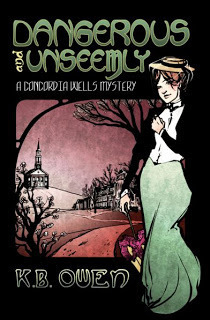
An unseemly lesson…in murder.
The year is 1896, and Professor Concordia Wells has her hands full: teaching classes, acting as live-in chaperone to a cottage of lively female students, and directing the student play, Macbeth.
But mystery and murder are not confined to the stage. Malicious pranks, arson, money troubles, and the apparent suicide of a college official create turmoil at the women’s college. For Concordia, it becomes personal when a family member dies of a mysterious illness, and her best friend is attacked and left for dead.
With her friend still in danger and her beloved school facing certain ruin, Concordia knows that she must act. But uncovering secrets is a dangerous business, and there are some who do not appreciate the unseemly inquiries and bold actions of the young lady professor. Can she discover the ones responsible…before she becomes the next target?
Absorbing in its memorable characters, non-stop plot twists, and depiction of life in a late-nineteenth century women’s college, Dangerous and Unseemly is a suspenseful and engaging contribution to the cozy historical mystery genre. Fans of Harriet Vane and Maisie Dobbs will find in Concordia Wells a new heroine to fall in love with.
Available at:
Amazon
Scribd
How about a little mystery fun...and a prize! Each stop in K.B. Owen's book launch tour has a mystery question to answer. When you have them all, unscramble the answers to which ROOM, WEAPON, and SUSPECT, and email Kathy at kbowenwriter(at)gmail(dot)com. She'll announce the winner (chosen from the correct entries) at Karen McFarland's blog ( http://www.karenmcfarland.com ), the last stop of the tour. What do you win? A free ebook copy of Dangerous and Unseemly, and a $25 gift card of your choice to either Starbucks, Amazon, or Barnes and Noble! If you run into a few stumpers - no problem! Check out her Mystery Quizzes page http://kbowenmysteries.com/ mystery-quizzes/ for links to the answers. If you've joined us in the middle of the tour, the complete list of Book Tour hosts can be found at kbowenmysteries.com . Good luck!
One of the following is NOT a rule of Golden Age detective fiction, as famously listed by literary critic Ronald Knox (in a preface to a 1929 collection of detective stories). Which is it?
A) No more than one secret room or passage is allowable
B) The butler should not be the culprit
C) No Chinaman must figure in the story
D) Twin brothers, and doubles generally, must not appear unless we are duly prepared for them
Published on February 24, 2013 21:01
February 23, 2013
Twitterific
by Elizabeth S. Craig, @elizabethscraig

Twitterific is a compilation of all the writing links I shared the previous week.
The links are fed into the Writer’s Knowledge Base search engine (developed by writer and software engineer Mike Fleming) which has over 19,000 free articles on writing-related topics. It's the search engine for writers.
Sign up for our free newsletter for monthly writing tips and interviews with top contributors to the WKB or like us on Facebook.
Mike Fleming is working with author and writing coach James Scott Bell to offer an online, interactive, writing program to help make your next novel great. It's called "Knockout Novel" and you can learn more about it at KnockoutNovel.com. Plus, all the data is stored in your Hiveword account for easy access.
The Most Annoying Horror Movie Cliches: http://bit.ly/U082bg @HorrorMovies
Fleshing Out Your Protagonist: Creating An Awesome Character: http://bit.ly/U0b4w8 @woodwardkaren
Dear Lack of Follow-Through: A Letter to 1 Writer's Anti-Muse: http://bit.ly/Y1v4wx @robdyoung
How Can We Avoid Cookie-Cutter Writing? http://bit.ly/Y1veE5 @jodyhedlund
3 Ways Cause and Effect Can Build Your Story: http://bit.ly/U0bS45 @4YALit
How much internalized self-awareness does a character need? http://bit.ly/Y1vvXq @juliettewade
1 writer reflects on her 2-year self-pub anniversary: http://bit.ly/U0ciaS @goblinwriter
Writing Residency Programs: Is this what your writing needs now? http://bit.ly/Y1was5 @2KoP
Advice for Understanding the New Age in Publishing and Promotion: http://bit.ly/U0cZkl
Use Lists to Provide Engaging Posts That are Easy to Write and Read: http://bit.ly/U0d3ka @ninaamir
Want to Write Early? The Most Successful Techniques for Rising Earlier: http://bit.ly/Y1xYBo @LeoBabauta
Enemies of the Art: Approval Addiction: http://bit.ly/U0ebnR @kristenlamb
How 1 novelist went from nothing to published on Amazon in 2 years: http://bit.ly/Y1ygrZ @criticalmargins
Reflections On Diversity and Fantastic Literature: http://bit.ly/U0erTS @adribbleofink
An agent answers: "What do you expect of your clients? What do you do for your clients" http://bit.ly/Y1yAqI @MacGregorLit
Character names that should be banned forever: http://bit.ly/U0eOxE @io9
Anatomy of a First Chapter: Make Your Beginning Count: http://bit.ly/Y1z28o @btmargins
Why the Internet is a Trap - and how this writer deals with it: http://bit.ly/U0f7IU @juliettewade
An editorial assistant on posting our fiction online: http://bit.ly/U0gPtH @sjaejones
How to write for role-playing games: http://bit.ly/Y1AQ1a @jammer0501
Pinterest for Novelists: Inspiration, Book Design and Book Trailers: http://bit.ly/U0h884 @LaurHarrington
Listservs and Forums for Book Marketing: http://bit.ly/Y1AW94 @fictionnotes
Show, Don't Tell: http://bit.ly/U0hZFE @americanediting
Revision: Add More "I Understand You" Moments: http://bit.ly/Y1BGLf @cockeyedcaravan
How to Avoid the Self-Published Look: http://bit.ly/U0ieR5 @GuyKawasaki @digibookworld
Cut the Flab—Make Every Word Count: http://bit.ly/Y1BQSN @noveleditor
The Creative Professionals' Guide to Drafting a Resume: http://bit.ly/U0ioYR @kristenfischer
An example of a poignant turning point: http://bit.ly/Y1C24F @kcraftwriter
Cover Art - So Where's The Problem? http://bit.ly/U0iHmi @jimchines
When Erotica Crosses the Line: http://bit.ly/Y1CD6h @smexys_sidekick
Diary of a Brainstorming Weekend: http://bit.ly/U0jnbk @AdriennGiordano
5 Examples of the Need for Multiple Hyphenation: http://bit.ly/Y1D4gW @writing_tips
Ray Bradbury On How To Keep And Feed A Muse: http://bit.ly/U0jxiR @woodwardkaren
5 Ways to Keep Up Marketing Motivation: http://bit.ly/YjA52n @duolit
Character Development: Morals & Ideology: http://bit.ly/Xm18gt @ava_jae
Character Introductions and Voice: http://bit.ly/Xm1nId @Julie_Gray
Writing mixed emotions in a character: http://bit.ly/YjAlOO @aliciarasley
How to Optimize Your Amazon Book Page to Sell More Books: http://bit.ly/Xm1xzj @bubblecow
Effective buying is hard for bookstores--this becomes an increasingly important reality for publishers: http://bit.ly/YjAq58 @MikeShatzkin
How to Get Rid of Writer's Block: http://bit.ly/Xm1LGJ @kimberlykincaid
3 Steps to Creating Believable Character Emotions: http://bit.ly/YjAAJN @marcykennedy
In the Quagmire of the First Draft: http://bit.ly/Xm1W4S @TaliaVance
Beware the Under-Cooked Story Concept: http://bit.ly/YjAH7X @storyfix
7 Tips for Great Book Club Visits: http://bit.ly/Xm27Nr @blurbisaverb
Library Skills for Writers: http://bit.ly/YjARw8 @karencv
Avoiding the Convenient Plot Point: http://bit.ly/Xm2h7B @davidbcoe
How to keep rich worldbuilding from bogging down your story: http://bit.ly/YjAVvR @juliettewade
25 Hard Truths About Writing And Publishing: http://bit.ly/Xm2t6S @chuckwendig {lang}
Script To Screen: "Rebel Without A Cause": http://bit.ly/YjBs0Q @gointothestory
Who sees each tweet? A helpful Twitter tip: http://bit.ly/Xm3BYj @alexisgrant
5 Ways to Write When You're Not Really Writing: http://bit.ly/YjBCFr @MidgeRaymond
Where to end your story: http://bit.ly/XBZKUZ @rxena77
8 ways to help your favorite author: http://bit.ly/XBZUMg @rachellegardner
Connecting Secondary Elements: http://bit.ly/WEtnrj @kid_lit
7 Libraries of Photographs You Can Use For Free: http://bit.ly/XC02eE @jonathangunson
6 Reasons Being a Pirate is Like Being a Writer: http://bit.ly/XC12zy
Give Stories Added Depth With a 'Ghost Plot': http://bit.ly/WEtYZS @yeomanis
Writing, Illustrating And Marketing Books For Kids: http://bit.ly/XC1k9t @thecreativepenn
Outlining in Reverse: http://nyti.ms/WEubwk @nytimes
3 indie bookstores file suit against Amazon and Big Six publishers for DRM: http://bit.ly/15yh4Qo @Porter_Anderson @laurahazardowen
Revising--set up more payoffs: http://bit.ly/XC1EFo @cockeyedcaravan
Explaining editorial revisions: http://bit.ly/WEuqY6 @kristinerusch
The Magic Of Stephen King: A Sympathetic Character Is Dealt A Crushing Blow They Eventually Overcome: http://bit.ly/XC1PAu @woodwardkaren
The Power of a Reader's Word of Mouth: http://bit.ly/X4B6Lu @jodyhedlund
9 Modern Tools Every Writer Should Use: http://bit.ly/V2CjYW @robdyoungwrites
Writing YA: On gendered and group-based insults and the characters that use them: http://bit.ly/V2CCml @wordforteens
4 things that warms one editor up to a query: http://bit.ly/X5pXtU
Twitter parties as promo: http://bit.ly/UaKhNZ @amandaluedeke
Bookstore Boss: http://bit.ly/X5q6NW @btmargins @BostonBkCritic
The eBook Path to Riches: Possibly Steeper Than Assumed: http://bit.ly/UaM4Cv @scalzi
"Pseudonyms Are Stupid" : http://bit.ly/X5rosu @darkcargo
6 Christian Literary Agent Blogs: http://bit.ly/UaMuJf @authormedia
Sympathetic Characters: Outcasts: http://bit.ly/UaMCZ5 @mooderino
6 reasons 1 reader stops reading a book: http://bit.ly/X5rEYu @annastanisz
Working through self-doubt: http://bit.ly/UaMRTS @adamisrael
Launching A Book Is Like Sending A Child To Play In Traffic: http://bit.ly/X5rRLf @catinitaly
How to Accept Your Procrastination (And Still Get Stuff Done): http://bit.ly/UaNeOx
Early business decisions for new self-publishers: http://bit.ly/X5zfX2 @deanwesleysmith
Kurt Vonnegut's "Shape of Stories" (Infographic): http://bit.ly/UbgIeV @MarkCN
Thinking like a publisher: expected costs: http://bit.ly/X5KIpo @deanwesleysmith
The value of failure: http://bit.ly/Ubh0Tc @woodwardkaren
An Easy Fix for a Tighter Point of View: http://bit.ly/VSHj2f @janice_hardy
Should writers "just" write? http://bit.ly/VUR8az @danblank
Why You Should Judge a Book By Its Cover: http://bit.ly/VSHyuh @nickthacker
Romance in Writing: Don't Force It: http://bit.ly/VURkH5 @ava_jae
Overcoming Stage Fright: http://bit.ly/VSHKtl
The power of screenwriters: http://bit.ly/VURD4w @gointothestory
The joys of being lowbrow: http://bit.ly/VSHPNF @junglereds @GMMalliet
Screenwriting: Now You Can Revise: Use the Final Draft Tools: http://bit.ly/VUS133 @cockeyedcaravan
Ideas for wowing editors and agents: http://bit.ly/VUSfqW
How Four Writers Find the Time to Write: http://bit.ly/XbPBND @Julie_Gray
When an idea strikes, act. http://bit.ly/XG99wW @tannerc
Theater Settings in Romance Novels: http://bit.ly/XbPT7d @rszalley
Your Goodreads Reviews Don't Just Stay on Goodreads: http://bit.ly/XG9r6J @readingape
Creative Writing Prompts: Shapeshifters, Real and Metaphorical: http://bit.ly/XbQaad @howtowriteshop
Maximizing Facebook–What We Can Learn From Puppy Dog Eyes and LOL Cats: http://bit.ly/XGa0O3 @kristenlambtx
Songwriting--how do you sell your songs? You *don't* sell your songs: http://bit.ly/XbScHt @usasongs
How much does an author's appearance matter? http://bit.ly/XGcewS @passivevoiceblg
5 Things Every Writer Should Know About Working With Independent Editors: http://bit.ly/12ReEg1 @BryanThomasS
5 Reasons Why We Fail at Our Writing Goals: http://bit.ly/XDt8Zc @jeanoram
10 Dos and Don'ts of Writing a Query Letter: http://bit.ly/12ReV2m @brianklems
What digital magazines can learn from ebook publishers: http://bit.ly/12Rf3in @laurahazardowen
Do You Like A Little Contradiction In Your Characters? http://bit.ly/XDttuQ @marcykennedy
Every Character Has A Story: http://bit.ly/12Rfc5C @bookviewcafe
Great Character: John McClane ("Die Hard"): http://bit.ly/XDtzTv @gointothestory
Facing fear as a writer: http://bit.ly/XDtEGK @joebunting
Secret or separate? Discreet and Discrete: http://bit.ly/12Rfl9a @LaurelGarver
50 Synonyms for "Villain": http://bit.ly/XDtKxS @writing_tips
Goal setting mistakes to avoid: http://bit.ly/XDtMpG @jwhite
Mystery, Magic, and the Aha! of the Reveal: http://bit.ly/12RfHfT @luciesmoker
1 writer's outlining process: http://bit.ly/VwpciL @daycathy
What Color is Your Writing World? http://bit.ly/VwpCWz
How to Change Telling into Showing: http://bit.ly/YgJV4p @jessicabell
First Person uncertainty: http://bit.ly/Vwq2fB @aliciarasley
Physical Attributes Entry: Lips: http://bit.ly/YgK3ku @angelaackerman
The Importance of Foreshadowing: http://bit.ly/VwqESk @sally_apokedak
5 ways to give a great author interview: http://bit.ly/YgKjzZ @chrisrobley
Split screen in Scrivener: http://bit.ly/VwrcYm @Gwen_Hernandez
6 Things Writers Can Learn From Television: http://bit.ly/YgKueq @woodwardkaren
Writing the Military: 5 Biggest Mistakes: http://bit.ly/VwrDSC @JosephZieja
Options for Reactions in a Sequel: http://bit.ly/YgKJGz @KMWeiland
How to Start a Book Club *Inside* a Book: http://bit.ly/Vws4Mt @wherewriterswin
When Writers Get Dumped: http://bit.ly/YgLdMD @jamesscottbell
Why 1 writer has returned to printing her self-pub books: http://bit.ly/VwtkiF @thecreativepenn
6 Ways to Evoke Emotion in Poetry and Prose: http://bit.ly/YgLj75 @AJWagoner
Description tips: http://bit.ly/VwtIhl @cockeyedcaravan
7 Tips for creating a PowerPoint Presentation: http://bit.ly/YgLsrf @nicolebasaraba
Setting – The First, Most Crucial Choice for your Career AND your Character: http://bit.ly/VwxsiJ @BlytheGifford
Top 10 Things You May Not Know About the Newbery Award: http://bit.ly/YgNbga
Why Should Writers Use Google+? http://bit.ly/Vwyb3q @gharness
The Publisher's Anxiety at the Electronic Book: http://bit.ly/W4b4In @thatjeffgomez
Setting up a co-authoring partnership: http://bit.ly/15nRu0v @ParanormYA
5 Reasons to Set Your Novel in a Famous Place: http://bit.ly/W4bmPd @ChuckSambuchino
Stuck or blocked? How to keep writing anyway: http://bit.ly/15nRFJc @dirtywhitecandy
A writer's guide to Gimp--installation: http://bit.ly/W5THH8 and fundamental techniques: http://bit.ly/W5TK5N @ClarissaDraper
Revamping bookstores--ideas/challenges from the #FutureFoyles workshop: http://bit.ly/VtrQ6p @Porter_Anderson @philipdsjones @miriamkate
Writers and ego--the violent shifts from over-confident to too insecure: http://bit.ly/Vtve1d @hartjohnson
3 Minutes to Better Scrivener Chapter Headings: http://bit.ly/VtVzMB @genelempp
50% of Amazon sales are planned purchaes, not results of browsing.Discoverability implications: http://bit.ly/15xUYh5 @Suw @Porter_Anderson
Published on February 23, 2013 21:01
February 21, 2013
Visual Methods of Writing
Guest post by Robert Ferrigno
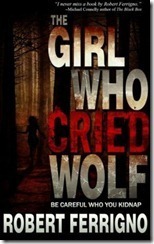 My life experiences prior to writing shaped my writing style and method, although I doubt anyone outside my cerebral cortex could have predicted it. Having earned degrees in Philosophy, Film-Making and Creative Writing, I intended to be a college professor, but things didn't work out. I call this "my close call."
My life experiences prior to writing shaped my writing style and method, although I doubt anyone outside my cerebral cortex could have predicted it. Having earned degrees in Philosophy, Film-Making and Creative Writing, I intended to be a college professor, but things didn't work out. I call this "my close call."
While studying film-making, I learned to visualize the story, to see it vividly spool out in my mind before I spent the money on filmstock. Today, video is virtually free, so I might not have learned this technique if I was in school today, which would be too bad, because I use it every day, in writing all my books, including my latest novel, The Girl Who Cried Wolf .
It Is All In the Matter of How You Edit a Book
As an author, I love to see a story unravel before my eyes, played out in a way that the reader will enjoy—moving them freely from one page to the next. I can actually do a lot of the editing in my head, playing out a scene from one point of view and then trying it again from another character's perspective. It saves time keyboarding if I can do a lot of the heavy lifting lying in bed seeing the book move forward and backward.
Once I have the basic plot, I physically storyboard my novels. I have a huge corkboard on my wall with every chapter eventually blocked out on a 3x5 card. This allows me to create a visual of the scenes and passages that follow one another to better determine how they work best. Over the course of writing a book, I’ll be moving chapters around because I see a different play of events. For example: Do you want to have an action scene followed by a love scene? What chapter works best when the main character is in a cliffhanger the chapter before? How long before the antagonist and protagonist meet?
Filmmaking Techniques
Mastering fiction. This is the job, the calling, the rollercoaster ride. It's hard, and no one ever really masters the form, which is one of the things that makes it so compelling to read and write. One of the best ways to bring a book to life is through characters that are more than marionettes, but real, in some ways more real than people we encounter in the rest of our lives.
Filmmaking plays into how I write my books in a way that many novelists would not typically think of—I see myself and my books very visually. I hear dialogue in my head and rehearse the dialogue in my head as if I were an actor. I am often walking around the house talking to myself in different voices and wearing different outfits.
The backstory of a great novel is always the imagination and thought that went into developing a story that has the ability to grab the attention of your audience. With the ability to bring my characters to life, I can see what they look like and how they are perceived in my head, but it is up to whoever has my book in their hands to do the same.
Writers Should Be Hyper-Aware of Their Surroundings
One thing that I have learned throughout the course of my life as an author is that the world is trying to help you. If you are out in the world, even in the most mundane of settings, you will encounter others. There are always power dynamics when people get together. Be aware of how they are dressed and how they talk, who touches whom, who makes eye contact and who doesn't. Each choice people make gives you an insight into their personalities. Check the shoes they are wearing, that’s what good detectives do, because shoes are an insight into character. I always want to know what my characters have for breakfast, even if they never have breakfast in the book, because that gives me insight into whom they are: oatmeal? Scrambled eggs? Black coffee? It matters. In The Girl Who Cried Wolf , the main character has breakfast with a cop who is helping him find his kidnapped girlfriend. The things the characters order, the way they eat, the way they handle their utensils, the banter over the food, who cleans their plate and who pushes it aside, all reveals who they are to the reader, and makes the scene more real. Which is the whole point.
Fiction vs. Reality
Visualizing a story allows it to come to life before your eyes—be it in your mind or in your living room as you are dressed as a character. It is my belief that the relationship between fiction and reality involves not only the author but the reader who will transform the author’s words and thoughts through their own personal experiences. It is the audience that truly makes the character live.
 Robert Ferrigno is the author of The Girl Who Cried Wolf, Heart of the Assassin, The Wake Up, Flinch, and other thrillers. You can find out more about him at his website and purchase his books, including his latest release, here.
Robert Ferrigno is the author of The Girl Who Cried Wolf, Heart of the Assassin, The Wake Up, Flinch, and other thrillers. You can find out more about him at his website and purchase his books, including his latest release, here.
 My life experiences prior to writing shaped my writing style and method, although I doubt anyone outside my cerebral cortex could have predicted it. Having earned degrees in Philosophy, Film-Making and Creative Writing, I intended to be a college professor, but things didn't work out. I call this "my close call."
My life experiences prior to writing shaped my writing style and method, although I doubt anyone outside my cerebral cortex could have predicted it. Having earned degrees in Philosophy, Film-Making and Creative Writing, I intended to be a college professor, but things didn't work out. I call this "my close call." While studying film-making, I learned to visualize the story, to see it vividly spool out in my mind before I spent the money on filmstock. Today, video is virtually free, so I might not have learned this technique if I was in school today, which would be too bad, because I use it every day, in writing all my books, including my latest novel, The Girl Who Cried Wolf .
It Is All In the Matter of How You Edit a Book
As an author, I love to see a story unravel before my eyes, played out in a way that the reader will enjoy—moving them freely from one page to the next. I can actually do a lot of the editing in my head, playing out a scene from one point of view and then trying it again from another character's perspective. It saves time keyboarding if I can do a lot of the heavy lifting lying in bed seeing the book move forward and backward.
Once I have the basic plot, I physically storyboard my novels. I have a huge corkboard on my wall with every chapter eventually blocked out on a 3x5 card. This allows me to create a visual of the scenes and passages that follow one another to better determine how they work best. Over the course of writing a book, I’ll be moving chapters around because I see a different play of events. For example: Do you want to have an action scene followed by a love scene? What chapter works best when the main character is in a cliffhanger the chapter before? How long before the antagonist and protagonist meet?
Filmmaking Techniques
Mastering fiction. This is the job, the calling, the rollercoaster ride. It's hard, and no one ever really masters the form, which is one of the things that makes it so compelling to read and write. One of the best ways to bring a book to life is through characters that are more than marionettes, but real, in some ways more real than people we encounter in the rest of our lives.
Filmmaking plays into how I write my books in a way that many novelists would not typically think of—I see myself and my books very visually. I hear dialogue in my head and rehearse the dialogue in my head as if I were an actor. I am often walking around the house talking to myself in different voices and wearing different outfits.
The backstory of a great novel is always the imagination and thought that went into developing a story that has the ability to grab the attention of your audience. With the ability to bring my characters to life, I can see what they look like and how they are perceived in my head, but it is up to whoever has my book in their hands to do the same.
Writers Should Be Hyper-Aware of Their Surroundings
One thing that I have learned throughout the course of my life as an author is that the world is trying to help you. If you are out in the world, even in the most mundane of settings, you will encounter others. There are always power dynamics when people get together. Be aware of how they are dressed and how they talk, who touches whom, who makes eye contact and who doesn't. Each choice people make gives you an insight into their personalities. Check the shoes they are wearing, that’s what good detectives do, because shoes are an insight into character. I always want to know what my characters have for breakfast, even if they never have breakfast in the book, because that gives me insight into whom they are: oatmeal? Scrambled eggs? Black coffee? It matters. In The Girl Who Cried Wolf , the main character has breakfast with a cop who is helping him find his kidnapped girlfriend. The things the characters order, the way they eat, the way they handle their utensils, the banter over the food, who cleans their plate and who pushes it aside, all reveals who they are to the reader, and makes the scene more real. Which is the whole point.
Fiction vs. Reality
Visualizing a story allows it to come to life before your eyes—be it in your mind or in your living room as you are dressed as a character. It is my belief that the relationship between fiction and reality involves not only the author but the reader who will transform the author’s words and thoughts through their own personal experiences. It is the audience that truly makes the character live.
 Robert Ferrigno is the author of The Girl Who Cried Wolf, Heart of the Assassin, The Wake Up, Flinch, and other thrillers. You can find out more about him at his website and purchase his books, including his latest release, here.
Robert Ferrigno is the author of The Girl Who Cried Wolf, Heart of the Assassin, The Wake Up, Flinch, and other thrillers. You can find out more about him at his website and purchase his books, including his latest release, here.
Published on February 21, 2013 21:01



